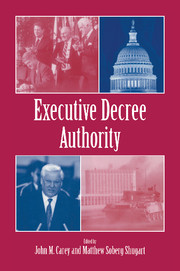Book contents
- Frontmatter
- Contents
- List of Contributors
- Preface
- 1 Calling Out the Tanks or Filling Out the Forms?
- Part I From Delegated to Constitutional Decree Authority
- Part II Constitutional Decree Authority and Conflict Between the Branches
- Part III Absence of Conflict Over Decree
- 8 Executive Decree Authority in France
- 9 In Search of the Administrative President: Presidential “Decree” Powers and Policy Implementation in the United States
- 10 Institutional Design and Executive Decree
- Appendix of Constitutional Provisions Regarding Decree
- References
- Index
9 - In Search of the Administrative President: Presidential “Decree” Powers and Policy Implementation in the United States
Published online by Cambridge University Press: 18 December 2009
- Frontmatter
- Contents
- List of Contributors
- Preface
- 1 Calling Out the Tanks or Filling Out the Forms?
- Part I From Delegated to Constitutional Decree Authority
- Part II Constitutional Decree Authority and Conflict Between the Branches
- Part III Absence of Conflict Over Decree
- 8 Executive Decree Authority in France
- 9 In Search of the Administrative President: Presidential “Decree” Powers and Policy Implementation in the United States
- 10 Institutional Design and Executive Decree
- Appendix of Constitutional Provisions Regarding Decree
- References
- Index
Summary
It is in the shadow-land between policy and its implementation – between the motion and the act – that the literature on the presidency is thinnest.
RICHARD P. NATHAN (1975: VIII)INTRODUCTION
The U.S. president lacks most of the explicit decree authorities available to chief executives discussed elsewhere in this volume. Nonetheless, conventional wisdom identifies the presidency as the dominant branch of the U.S. national government, with broad influence over policy outcomes. Furthermore, there are theoretical reasons to expect that an American president could use decree authorities to produce an impressive effect on policy. In Chapter 1 of this volume, Carey and Shugart argue that proactive executive tools will be formidable whenever the executive also holds some substantial reactive powers (e.g., a veto power) and/or whenever legislators find it collectively difficult to take action – independent of the executive – on salient policy questions. Both of these latter conditions are conventionally accepted as prevailing in U.S. national politics.
Carey and Shugart's argument applies to executives in general, not solely to presidents. However, although the U.S. Congress often delegates foreign affairs responsibilities to the president, it rarely delegates substantive policy-making authority directly to the president in domestic policy. Instead, it typically delegates to cabinet secretaries and agency heads. I focus in this chapter on the president's role in domestic affairs. In this arena, I argue, one key to understanding the president's influence on policy implementation is his or her constitutional mandate to ensure that the laws are “faithfully executed” by government agents. This mandate could be seen as an authority by which the president interprets statutory intent for bureaucrats.
- Type
- Chapter
- Information
- Executive Decree Authority , pp. 254 - 273Publisher: Cambridge University PressPrint publication year: 1998
- 7
- Cited by



